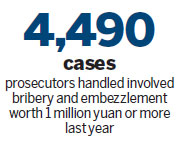Life with no parole for graft
Updated: 2016-04-22 07:10
By Cao Yin(China Daily Europe)
|
|||||||||
Convicted officials who are spared execution now must spend their remaining days behind bars
Chinese officials who are sentenced to death for serious corruption but are eventually spared now face life in prison without parole, according to new guidelines for judges.
Courts have three options when sentencing serious offenders, such as those who accepted millions in bribes: death; death suspended for two years; or life in prison with the option of parole after a recommended term.
Previously, a suspended death penalty could be commuted to life on appeal or if the offender displays good behavior. Further good behavior over several years could then secure release from prison.
However, official guidelines released on April 18 state that courts now can impose an additional sentence on such convicts that ensures they "will spend the rest of their life in prison, no matter how well they behave while serving their sentence", explains Pei Xianding, a senior judge with the Supreme People's Court.
The new power to hand down life without parole actually came into effect on Oct 1 as part of amendments to the Criminal Law. However, judges did not have a clear interpretation on how to use it until now.
According to the guidelines, Pei says the sentence can only be given in conjunction with a suspended death penalty; it cannot be given as a standalone punishment.

"For some defendants, the death penalty is too heavy and a suspended death sentence too light, so we came up with the new sentence after research and discussions, in a move to ensure the punishment is in line with the offense," he says, adding: "For those whose offenses meet the requirements of the death penalty, courts will sentence them to death without hesitation."
Zhou Guangquan, a criminal law professor at Tsinghua University, describes the change as an "alternative" to the death penalty, but stresses that it "must be enforced unconditionally".
"Defendants given such a penalty cannot be released or have their sentence commuted," he adds.
In a related move, the top judicial authorities issued a notice to prosecutors that said the minimum threshold for illicit assets accrued by a suspect to trigger a graft charge had been raised from 5,000 yuan to 30,000 yuan ($770 to $4,600; 680 to 4,100 euros).
Miao Youshui, another senior judge with the Supreme People's Court, says suspects who make smaller amounts through corruption will still be prosecuted if they refuse to return the illegally obtained assets, or if they have been sentenced for other criminal charges or been given administrative penalties for embezzlement or bribery.
In addition, he says, the definition of "property" in corruption cases has been expanded. "For example, house renovations, paying off debts or vacations are now defined as bribes."
The legal changes are intended to give judges and prosecutors more teeth in China's ongoing fight against corruption.
Between 2013 and 2015, courts heard 81,805 corruption trials, with 69,017 reaching a conclusion, according to official data. Prosecutors handled 4,490 cases that involved bribery and embezzlement worth 1 million yuan or more last year. They also began investigating ministerial-level officials, including Ling Jihua, former head of the United Front Work Department of the CPC Central Committee.
caoyin@chinadaily.com.cn
Today's Top News
Back on the up
China leads way on US adoptions
Ericsson reshapes and sees Q1 profit rising
Snowden sues Norway to seek safe travel to get prize
Nation's drones are in demand
Beacons and gun salutes as Queen turns 90
Buckingham Palace seeks royal social media operators
Nearly 180,000 migrants reach EU by sea in 2016
Hot Topics
Lunar probe , China growth forecasts, Emission rules get tougher, China seen through 'colored lens', International board,
Editor's Picks

|

|

|

|

|

|







